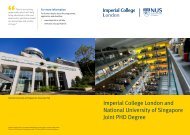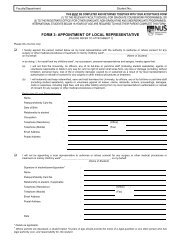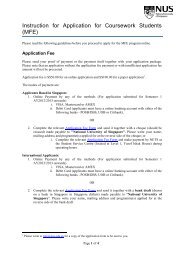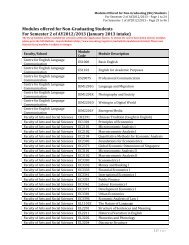engineering
engineering
engineering
Create successful ePaper yourself
Turn your PDF publications into a flip-book with our unique Google optimized e-Paper software.
Table 3.2.10f: Recommended Semester Schedule for ME Students with an accredited Polytechnic Diploma<br />
Year 2<br />
Semester 3 MCs Semester 4 MCs<br />
MA1301 Introductory Mathematics (fulfils<br />
Breadth)<br />
PC1222 Fundamentals of Physics II (fulfils UEM<br />
& Level-1000 Physics requirement)<br />
4 MA1505 Mathematics I 4<br />
4 PC1431 Physics IE<br />
ME2103 Engineering Visualisation and Modelling 3 ME2143 Sensors and Actuators 4<br />
ME2151 Principles of Mechanical Engineering<br />
Materials<br />
3 ME2101 Fundamentals of Mechanical Design 4<br />
ME2134 Fluid Mechanics I 4 ME2135 Fluid Mechanics II 4<br />
Sub-Total 18 Sub-Total 20<br />
Year 3<br />
Semester 5 MCs Semester 6 MCs<br />
MA1506 Mathematics II 4 EG2401 Engineering Professionalism 3<br />
ME2121 Engineering Thermodynamics 3 ME2114 Mechanics of Materials II 3<br />
ME2142 Feedback Control Systems 4 ME2142 Feedback Control Systems 4<br />
ME2113 Mechanics of Materials I 4 ME3102 Mechanical Systems Design II 4<br />
ME3101 Mechanical Systems Design I 4 ME Technical Elective 1 4<br />
ME3112 Mechanics of Machines 4 SS* 4<br />
Sub-Total 23 Sub-Total 22<br />
Year 4<br />
Semester 7 MCs Semester 8 MCs<br />
ME4101A B.Eng. Dissertation 6 ME4101A B.Eng. Dissertation (cont’d) 6<br />
ME3122 Heat Transfer 4 Unrestricted Elective Module 1 4<br />
ME3162 Manufacturing Processes 4 ME Technical Elective 4 4<br />
ME Technical Elective 2 4 ME Technical Elective 5 4<br />
ME Technical Elective 3 4 GEM* 4<br />
Sub-Total 22 Sub-Total 22<br />
~ Please note that this semester schedule is only recommended, you need not adhere strictly to this schedule.<br />
* These ULR modules (GEM, SS, Breadth) can be read in any semester.<br />
3.3 Minor Programmes<br />
A Minor Programme is a coherent course of study which<br />
provides significant depth in a certain area outside the<br />
student’s discipline. Due to limited places in each<br />
programme, each student is only allowed to read one<br />
Minor Programme.<br />
The Modular Credits (MCs) requirements for a Minor<br />
Program should not be less than 24 MCs. Where there<br />
exists a substantial equivalence in the modules,<br />
departments may grant double counting of MCs from the<br />
major requirements (up to a maximum of 8 MCs) towards<br />
the MCs requirement in the Minor Program. A student may<br />
use up to 20 MCs to satisfy the Unrestricted Elective<br />
Modules (UEMs) and another 8 MCs from the Breadth<br />
component of the University Level Requirement. If a student<br />
is unable to double count the minor modules towards his<br />
Breadth or UEM, he/she will take them on top of the 160<br />
MCs graduation requirement. The Minor modules will be<br />
graded and the Cumulative Average Point (CAP) will be<br />
counted towards degree classification. The Minor<br />
Programme will be reflected in the student’s academic<br />
transcript. For more information on these programmes and<br />
other minor programmes, please refer to:<br />
http://www.eng.nus.edu.sg/ugrad/programs/minor.html<br />
…228…<br />
The following Minor Programmes are offered by the<br />
Faculty of Engineering:<br />
3.3.1 Minor in Bio<strong>engineering</strong> (hosted by the Division<br />
of Bio<strong>engineering</strong>)<br />
Bio<strong>engineering</strong> is a discipline that advances knowledge in<br />
<strong>engineering</strong>, biology, and medicine. It improves human<br />
health through inter disciplinary integration of the<br />
<strong>engineering</strong> sciences with the biomedical sciences.<br />
Bio<strong>engineering</strong> forms part of the Life Sciences, which is<br />
fast becoming a strategic area of economic development<br />
in Singapore. The aim of this minor is to enable students<br />
to understand how the principles and tools of traditional<br />
<strong>engineering</strong> fields, such as mechanical, materials,<br />
electrical, and chemical <strong>engineering</strong>, can be applied in<br />
biology and medicine. It will be suited to students who<br />
wish to pursue further career opportunities in hospitals<br />
and health care centres, medical devices, pharmaceutical,<br />
biotechnology and biomaterials industries. More details of<br />
the programme can be found at the Division of<br />
Bio<strong>engineering</strong> website:<br />
http://www.bioeng.nus.edu.sg/edu/ ugrad/minor.htm<br />
Only Stage 2 <strong>engineering</strong> students are eligible to apply<br />
for the Minor in Bio<strong>engineering</strong> Programme. The intake<br />
for the programme is in January each year.<br />
4







